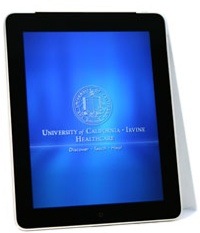Traditionally, first-year medical students are awarded white coats to signify their entry into the medical community. But at an Aug. 6 ceremony, each member of the UC Irvine School of Medicine’s incoming class of 2014 will find an iPad pre-loaded with everything necessary for the first year of course work in their coat pocket.
As part of its new iMedEd Initiative, the medical school has developed a comprehensive, iPad-based curriculum, reinventing how medicine is taught in the 21st century and becoming the first in the nation to employ a completely digital, interactive learning environment for entering students, says Dr. Ralph V. Clayman, dean of the UCI School of Medicine.
“It is our firm belief that a digitally based curriculum will be the wave of the future, and UCI seeks to be a leader in the innovative presentation of information to students,” he adds.
According to Dr. Warren Wiechmann, the school’s director of instructional technologies, the iMedEd Initiative calls for eliminating the classic lecturer-passive listener model and putting everything students need to succeed in class at their fingertips. The wireless, 16GB, 3G iPad features hundreds of medical applications; note-taking and recording capabilities; and many other tools to complement various learning styles. Students will be able to view short, topical lectures via podcast prior to meeting for small-group discussion. N
Additional content includes course outlines and handouts, slide presentations and first-year textbooks in a digital format that allows highlighting and notation. Students will have access to audio and video libraries as well as podcasts. And technological advances such as digital stethoscopes and handheld ultrasound units are currently being configured, says Wiechmann.
One example of the technology’s myriad interactive learning possibilities: an on-call neurosurgeon — regardless of location — could craft a 30-minute lecture via a webcam for students to watch online. They could review it as often as necessary and consult supplemental materials, including step-by-step videos, to clarify the lesson. When students meet with the neurosurgeon in an office, classroom or hospital setting, they can focus on specific cases to further augment the learning experience.
Such innovation is merely the tip of the iceberg, Clayman says. “In the future, physicians will literally carry a library’s worth of information on a tablet computer in the pocket of their white coat or suit jacket,” he adds. “The age of electronic medicine is upon us, and both patient and practitioner will benefit. UCI’s iMedEd curriculum is a step in that direction.”

